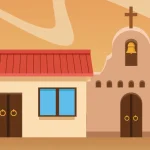The church from the onset of COVID-19 witnessed a transformation in its mode of operation. Pastors, even in the remotest of areas, were seen uploading their sermon on YouTube or Facebook so that the flock did not lack spiritual food. Gospel television channels aired prominent church services and sermons of preachers on Sundays to make sure that the believers could listen to God’s word and be strengthened in their Spirit.
As some relaxations came in with unlock phases, the churches were keen to open their buildings for people to come and worship. Some churches developed innovative ways of worship such as drive-in worship while some others opened their facilities adhering to physical-distancing norm, temperature-screening protocols and other government regulations.
The pandemic-induced lockdown could not, in fact, lock down the spiritual connect between churches and their congregation, thanks to digital media. In a way, CoVid (church on video) helped people cope with COVID-19. To some, online media even gave the freedom to attend any church or follow any preacher.
But even with tremendous technological aid, social media and internet available, many seekers are longing for the day to greet one another with a “holy hug” (2 Cor 13:12), partake from “one loaf” (1 Cor 10:17) drink from the cup (1 Cor 10:16) and gather as one body having one spirit (Ephesians 4:5).
Having said that, we should not forget to understand the heart of God. He would definitely desire His body to be the hope during this time of doubt and anxiety. As Christ’s body, how can we look at this situation differently?
First, we should take some time to lament. Many are grieving and troubled, and we need to stand in the forefront to grieve with those who grieve. Theologian N T Wright, in his article in the TIME magazine—titled Christianity Offers No Answers About the Coronavirus. It’s Not Supposed To—wrote: “Rationalists (including Christian rationalists) want explanations; Romantics (including Christian romantics) want to be given a sigh of relief. But perhaps what we need more than either is to recover the biblical tradition of lament. Lament is what happens when people ask, “Why?” and don’t get an answer. It’s where we get to when we move beyond our self-centred worry about our sins and failings and look more broadly at the suffering of the world.”
This is a unique opportunity for the church to respond to the social, physical, emotional and spiritual challenges faced by the society.
Does God want us to step back and take a look at what’s happening around us? Will He ever desire that we pause our busy ministry lives and just lament with the sufferings around and go to Him? Rather than finding ways to open the church buildings somehow, we all need to pause and understand this as a time to lament and to wait on God for His move.
Wright goes on to say, “As the Spirit laments within us, so we become, even in our self-isolation, small shrines where the presence and healing love of God can dwell. And out of that there can emerge new possibilities, new acts of kindness, new scientific understanding, new hope. New wisdom for our leaders? Now there’s a thought.”
Hopefully, we get a cue on the importance of lament and the hope we have in God.
Second, God could be directing us to be the hope for the communities we are in. Rather than providing just “spiritual services”, He invites us to partner with Him in being His hands and feet. Through every pandemic in the history of the world, the church has stood out in serving the sick and the needy.
During the plague periods in the Roman Empire, Christians made a name for themselves because of their service to others. Historians have suggested that the terrible Antonine Plague of the 2nd century, which might have killed off a quarter of the Roman Empire, led to the spread of Christianity—as Christians cared for the sick and offered a spiritual model whereby plagues were not the work of angry and capricious deities but the product of a broken Creation in revolt against a loving God.
The other infamous epidemic is the Plague of Cyprian, named after the bishop of Carthage who gave a colourful account of this disease in his sermons. His contemporary, Bishop Dionysius, described how Christians “heedless of danger … took charge of the sick, attending to their every need”.
The Lord would expect us to be more missional in nature to the communities we are planted in. As New York was hitting the peak of infections, it was hope and love in action when the Samaritan’s Purse headed by Franklin Graham set up white tent facility to treat the COVID-19 patients in the famous New York Central Park field where his dad Dr Billy Graham conducted a crusade way back.
Will churches and facilities in India open up as isolation and treatment centres to take care of the sick and the needy? Would it be a pleasing offering to the Lord to care for the sick at this juncture than being intrinsic in our outlook? Will we be able to carry the message of hope and healing to those weary and wounded? Paul stresses on good works that we need to do as being a part of the new creation (Eph 2:8).
Rather than providing just “spiritual services”, He invites us to partner with Him in being His hands and feet.
Third, we can also encourage our churches to be a part of the supply chain by resorting to farming and other agricultural models. As we are staring at difficult times with the economy limping back and the vaccine still some time away, we need to arm ourselves to be involved in doing everything we can to see our nation thrive by our life and work. Someone said it’s not the survival of the fittest but the survival of the quickest. The Lord expects us to not only be online but be His hands and His feet in these tough times. God created man to tend the garden (Gen 2:15).
Cardinal George Alencherry in his pastoral epistle dated June 21 to the catholic churches gave some wonderful suggestions for the believers to follow. One of them caught my attention. He advised not to leave any wasteland in the properties under the possession of the diocese, churches, individuals and organisations. He also encouraged people to do terrace farming. Hence, we have a big opportunity to be a part of the supply chain. We should take giant strides in moving to be a self-reliant society rightly termed ‘Atmanirbhar Bharat’ by our Prime Minister rather than being a consumeristic one.
People are searching for answers in this time of the pandemic. The conspiracy theories around the tragic deaths of Bollywood actor Sushant Singh Rajput and that of the owner of the famous Tirunelveli halwa down south give us a glimpse of the darkness the society is facing.
This is a unique opportunity for the church to respond to the social, physical, emotional and spiritual challenges faced by the society. Jesus is the answer to the world gripped by COVID-19. Will we respond with the love of Christ?
The Lord will segregate the goat and sheep amongst His followers based on the deeds we do. “Then the King will say to those on his right, ‘Come, you who are blessed by my Father, inherit the kingdom prepared for you from the foundation of the world. For I was hungry and you gave me food, I was thirsty and you gave me drink, I was a stranger and you welcomed me, I was naked and you clothed me, I was sick and you visited me, I was in prison and you came to me.’ Then the righteous will answer him, saying, ‘Lord, when did we see you hungry and feed you, or thirsty and give you drink? And when did we see you a stranger and welcome you, or naked and clothe you? And when did we see you sick or in prison and visit you?’ And the King will answer them, ‘Truly, I say to you, as you did it to one of the least of these my brothers, you did it to me’” (Matthew 25:34–40).






